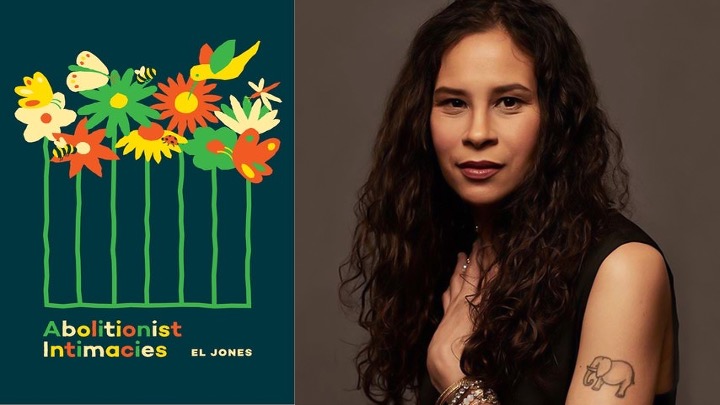by ROBERTO SIRVENT

In this series, we ask acclaimed authors to answer five questions about their book. This week’s featured author is El Jones . Jones is a poet, journalist, professor and activist living in Halifax, Nova Scotia. She teaches at Mount Saint Vincent University, where she was named the 15th Nancy’s Chair in Women’s Studies in 2017. Her book is Abolitionist Intimacies .
Roberto Sirvent: How can your book help BAR readers understand the current political and social climate?
El Jones: Abolitionist Intimacies is a book about fighting for the abolition of prisons, borders, and carceral control across institutions. Focused on Canada, and more specifically on the province of Nova Scotia, it bears witness to the violences of the Canadian state that are often buried in our claims to politeness, diversity, and our mythology of not being “like” the United States.
It is not an “abolition 101” guide explaining political or activist steps; rather, told across essays, memoir, criticism, poetry, and journalism, it is a book documenting the voices and resistance of prisoners, and the frontlines work of those, particularly Black women, who resist prisons, deportations, and state violence. Based on a decade of grassroots work with incarcerated people, the book argues that far from being an academic project, abolition is lived by prisoners, their families, and working class women.
While the state uses carceral intimacies and forced proximities against us – the strip search, the recorded phone call, the surveilled visit – abolitionist intimacies are the acts of collective care and love that we draw on to organize.
From historical Black communities, to courtrooms, to front line actions, the book traces the many ways we encounter state violence in Canada and the strategies we use towards freedom.
What do you hope activists and community organizers will take away from reading your book?
Post 2020, with the mainstream introduction to concepts like defunding the police and abolition, there have been a number of books explaining these movements. Abolitionist Intimacies moves beyond theory to capture the living and lived experiences of those who are incarcerated or facing state violence, and the deep bonds of love and relation with those fighting alongside them for liberation. Ultimately, this is a book about love, and how love is built and sustained through collective action and organizing. It is a book about the “women’s work” of organizing, the legacies of colonization, diasporic life, and the current realities of African Nova Scotia, home of the oldest Black contact in North America. It is not a step-by-step guide to activism, but rather, a chronicle of what it is to do and live this work, with all the doubt, despair, and moments of joy and success as well.
Stylistically, the book is also an intervention into academia, offering spoken word, poetry, diary entries, archiving, reporting from court, and other language strategies to witness and to tell the stories of those caught in the belly of the beast.
We know readers will learn a lot from your book, but what do you hope readers will un-learn? In other words, is there a particular ideology you’re hoping to dismantle?
Robyn Maynard’s book Policing Black Lives (Fernwood Press, 2017) traced the realities of anti-Black racism and policing in Canada. Following in the wake of that book, Abolitionist Intimacies deconstructs the ongoing narrative that Canada is kinder, better, and more polite. In fact, there is a very Canadian way in which anti-Black violence takes place, buried in bureaucratic systems, absences in policy and data, and claims to being progressive (what I call the “violence of the paperwork.”) For U.S. or international readers, the book shatters the myth that mass incarceration is a largely U.S phenomenon, and that countries like Canada offer an enviable justice and policing system: documenting from inside maximum security units, from phone lines in detention facilities and prisons across Canada, and from the communities shattered by policing and border violence, the book shows over and over again the brutality of the Canadian system.
As Joy James (2020) observes, abolition has increasingly become an academic project divorced from the lives of the overwhelmingly working class Black people who actually suffer within these systems. Abolitionist Intimacies offers alternatives to an abolition contained to classrooms, showing the abolitionist acts of prisoners and their families and communities.
Which intellectuals and/or intellectual movements most inspire your work?
Black Agenda Report for more
